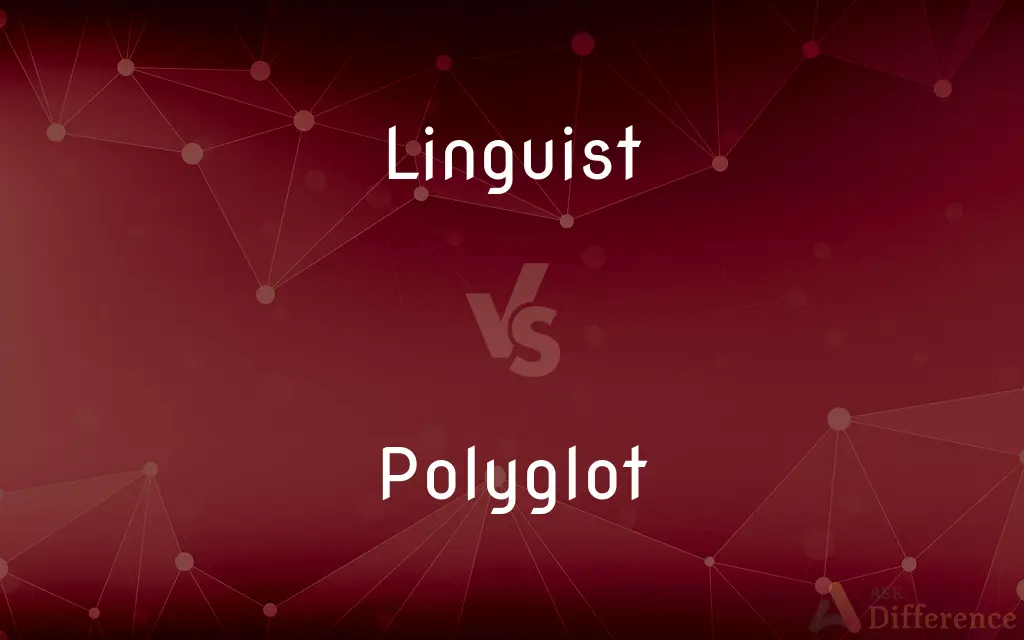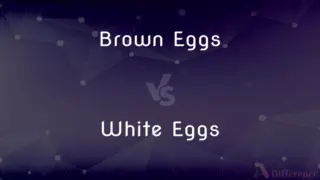Linguist vs. Polyglot — What's the Difference?
Edited by Tayyaba Rehman — By Urooj Arif — Published on February 28, 2024
A linguist is a professional who studies the structure, history, and theory of languages, while a polyglot is someone proficient in multiple languages, often without formal linguistic training.

Difference Between Linguist and Polyglot
Table of Contents
ADVERTISEMENT
Key Differences
Linguists are experts in the scientific study of language. They may focus on various aspects of language, including phonetics (sounds), morphology (structure of words), syntax (sentence structure), semantics (meaning), and sociolinguistics (language use in social contexts).
Polyglots, on the other hand, are individuals who have mastered the ability to speak, understand, read, and write in several languages. The proficiency of a polyglot is defined by their linguistic skills rather than their understanding of linguistic theory.
Linguists often have academic degrees in linguistics and may work in research, education, language preservation, computational linguistics, or related fields. Their work is not necessarily about speaking multiple languages but understanding how language works as a system. Polyglots may acquire languages through immersion, self-study, travel, heritage, or a passion for learning new languages. While some polyglots may also be linguists, the primary distinction lies in the practical use and knowledge of multiple languages versus the academic study of language as a system.
The motivations and goals of linguists and polyglots can also differ. Linguists are often driven by a desire to understand the underlying principles of language, solve theoretical puzzles, or apply linguistic knowledge to solve real-world problems. Polyglots may be motivated by cultural interest, communication needs, career goals, or personal challenges.
The key difference between a linguist and a polyglot lies in the focus of their interest and expertise: linguists study the structure and function of language as a scientific discipline, while polyglots focus on acquiring and using multiple languages.
ADVERTISEMENT
Comparison Chart
Focus
Study and analysis of language systems.
Proficiency in speaking multiple languages.
Training
Formal academic training in linguistics.
Language skills acquired through various methods.
Motivation
Understanding language theory and application.
Communicating in and exploring multiple languages.
Work
Research, teaching, language preservation, computational linguistics.
May work in translation, interpretation, international relations, etc.
Expertise
Phonetics, syntax, semantics, sociolinguistics, etc.
Fluency in speaking, reading, and writing in multiple languages.
Compare with Definitions
Linguist
Computational linguist.
He developed software for speech recognition as a computational linguist.
Polyglot
Multilingual speaker.
Fluent in five languages, the polyglot easily navigated international conferences.
Linguist
Language scientist.
The linguist published a paper on the phonetic variations across regional dialects.
Polyglot
Language enthusiast.
As a polyglot, she learned languages for fun, adding a new one every year.
Linguist
Academic researcher.
As a linguist, she specialized in the syntax of endangered languages.
Polyglot
Self-taught learner.
She became a polyglot through self-study and immersion in different cultures.
Linguist
Language preservationist.
The linguist worked on documenting and revitalizing a nearly extinct language.
Polyglot
Cultural communicator.
The polyglot used his language skills to foster cross-cultural understanding.
Linguist
Sociolinguist.
The sociolinguist studied how language use varies in different social contexts.
Polyglot
Multilingual professional.
Working in diplomacy, the polyglot's language proficiency was invaluable.
Linguist
A specialist in linguistics.
Polyglot
Speaking, writing, written in, or composed of several languages.
Linguist
A person skilled in languages.
Polyglot
A person who speaks more than one language.
Linguist
A master of the use of language; a talker.
I'll dispute with him;He's a rare linguist.
Polyglot
One who has mastered (especially when able to speak) several languages.
Common Curiosities
Are all polyglots also translators or interpreters?
Not all polyglots work as translators or interpreters. While many have the skills to do so, their professional and personal interests may lie in other areas.
Do linguists have to speak multiple languages?
Not necessarily. Linguists may be monolingual or multilingual, but their expertise lies in understanding language structures and theories rather than speaking multiple languages.
How do linguists study languages they don't speak?
Linguists use a variety of methods, including working with native speakers, analyzing written texts, and applying linguistic theories to understand languages they do not speak fluently.
What drives someone to become a polyglot?
Motivations can include cultural interest, career goals, personal enrichment, travel, and a love for languages and communication.
Can someone be both a linguist and a polyglot?
Yes, it's possible to be both if one has formal training in linguistics and can speak multiple languages fluently.
Can a polyglot be considered a linguist without formal training?
While a polyglot may have an in-depth understanding of multiple languages, being a linguist typically requires formal academic training in linguistics.
How many languages does one need to know to be considered a polyglot?
There is no fixed number, but being fluent in at least three to four languages is often considered the threshold for being a polyglot.
What kind of jobs can linguists have outside of academia?
Linguists can work in fields like computational linguistics, language education, speech pathology, language policy, and more, applying their expertise in various industries.
How does a linguist's work impact society?
Linguists contribute to society by preserving endangered languages, developing language technologies, improving language education, and enhancing our understanding of human cognition and communication.
What's the difference between a linguist and a language teacher?
A language teacher focuses on teaching the skills needed to speak or write in a language, while a linguist studies the structure, history, and function of languages more broadly.
Share Your Discovery

Previous Comparison
Brown Eggs vs. White Eggs
Next Comparison
Indian Ringneck vs. AlexandrineAuthor Spotlight
Written by
Urooj ArifUrooj is a skilled content writer at Ask Difference, known for her exceptional ability to simplify complex topics into engaging and informative content. With a passion for research and a flair for clear, concise writing, she consistently delivers articles that resonate with our diverse audience.
Edited by
Tayyaba RehmanTayyaba Rehman is a distinguished writer, currently serving as a primary contributor to askdifference.com. As a researcher in semantics and etymology, Tayyaba's passion for the complexity of languages and their distinctions has found a perfect home on the platform. Tayyaba delves into the intricacies of language, distinguishing between commonly confused words and phrases, thereby providing clarity for readers worldwide.










































